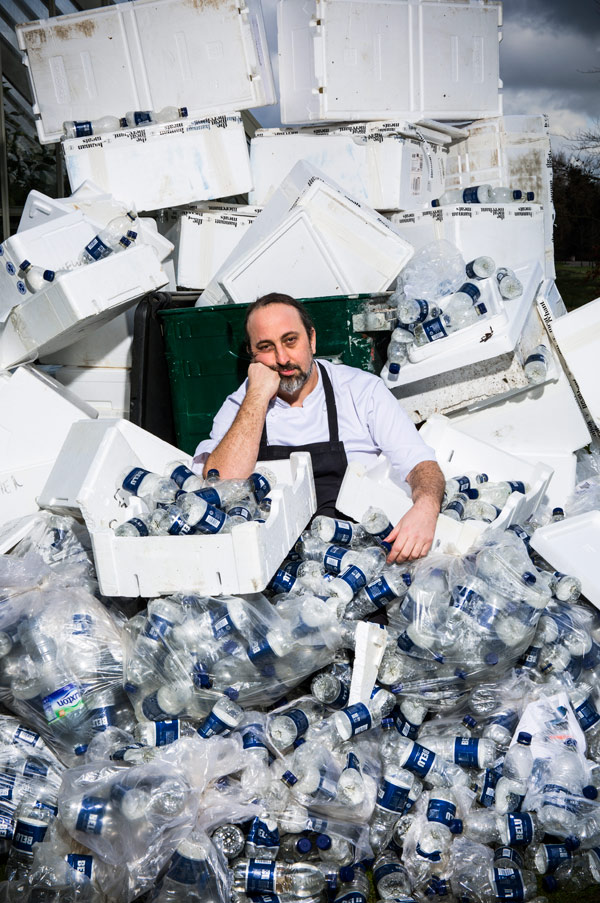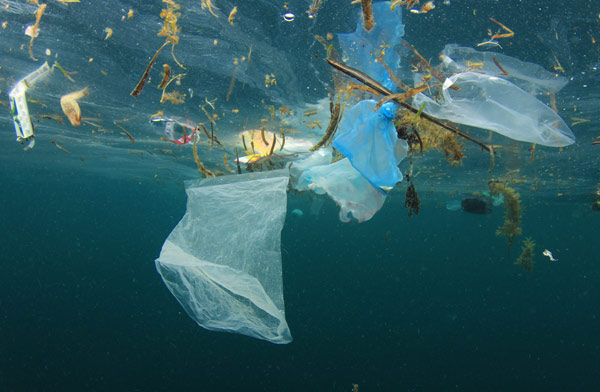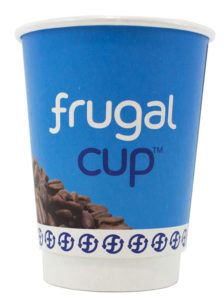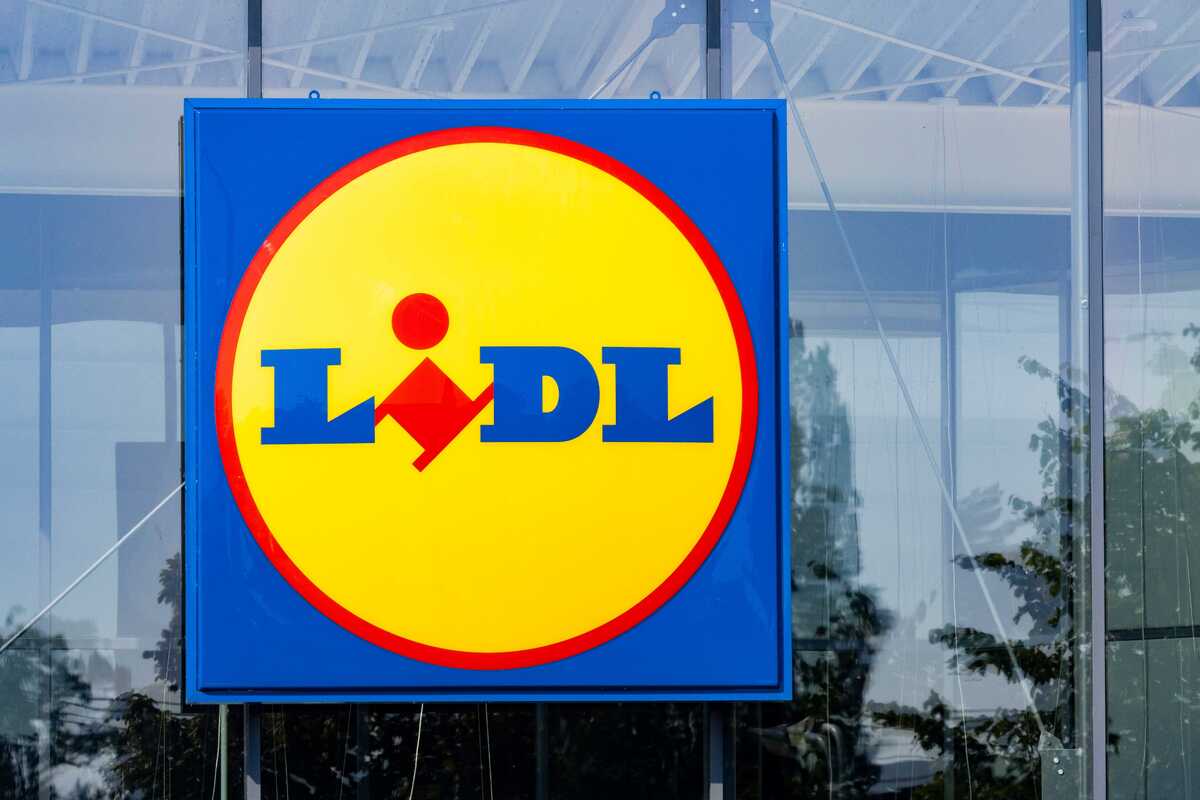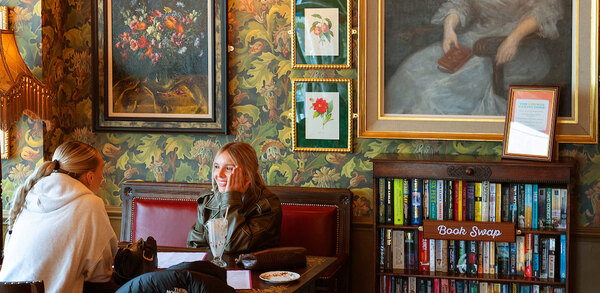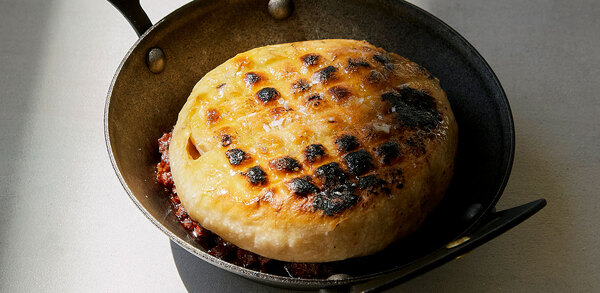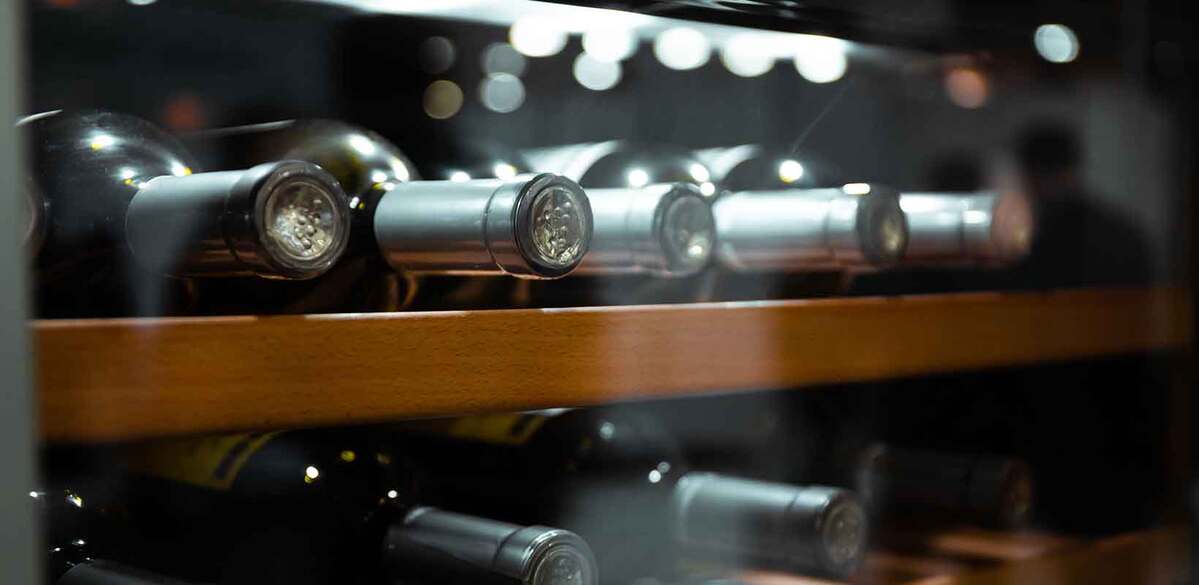Luke Holder and #chefsagainstplastic: good riddance to bad rubbish
The tide is turning in kitchens across the country, thanks to chef Luke Holder's campaign against unnecessary plastic use. Emma Lake reports
Sir David Attenborough's softly spoken warnings of seas of plastic waste rapidly turning the world's oceans into toxic bathtubs were a call to action for Luke Holder, joint head chef of Hartnett Holder & Co at Lime Wood hotel in Lyndhurst, Hampshire.
His simmering frustration about the time and money wasted on dealing with and disposing of unnecessary packaging developed into an urgent feeling of responsibility. What followed was #chefsagainstplastic,
Fellow chefs were quick to back up Holder. Paul Foster of Salt in Stratford-upon-Avon, Kenny Atkinson of House of Tides in Newcastle upon Tyne, Paul Ainsworth of No 6 in Padstow, Tom Kerridge, chef-owner of the Hand & Flowers and the Coach in Marlow, and chef and food writer Gizzi Erskine were among those signing up the cause, along with Holderâs co-head chef Angela Hartnett.
Little more than a month on, a sea tide of change is under way at Lime Wood, and Holder is discovering that he has become the reluctant leader of an environmental campaign. He says the response has been âquite overwhelming and intimidatingâ, but insists that making changes in his kitchen has not. He explains: âThe answer is to look at your own suppliers, look at your own business and effectively make that change.
âMy fellow chefs have given a lot of support in retweeting and trying to get the message out there and I know theyâre just doing what Iâm doing. Theyâre engaging with their suppliers and asking, can we look at it and think of a different way? I think thatâs all it needs to be.
âThis isnât an uphill battle, there isnât a fight. We donât need to take a stance and say we wonât use this company. Weâre all on this planet together and everybody realises the plastic thing needs to stop. Everyoneâs got a guilty conscience.â
Holderâs expectations are not unrealistic. He has accepted that a plastic-free alternative to his beloved vacuum-pack bags does not (yet) exist, but he believes that if everyone takes responsibility for their corner of the planet, it will have an impact.
He says: âThere is a need to have plastic in use within kitchens; what there isnât a need for is plastic for plasticâs sake. Thatâs why I started engaging with suppliers and asking why we canât have our herbs delivered in paper bags rather than plastic bags. When you start looking at everything that comes in the back door, you start asking whether there is a need for that plastic or is it just wasteful.
âWe all have a social consciousness to think of, not just our lives today but the generations to go in front of us. We need to leave the planet in a usable condition and itâs so easy.â
Savvy suppliers
Suppliers to Hartnett Holder & Co have been quick to act, and fish is already being delivered to the restaurant in boxes made from cardboard rather than polystyrene, herbs are arriving in paper bags, butchers use peach paper and cartons of orange juice are returned to be cleaned and reused.
Holder says: âIt really isnât about taking people on â" people are really willing. Weâre not the only ones who have seen the destruction of our planet. Everyone wants to make sure the planet survives so we can all live happily. We all want to visit the Great Barrier Reef, we all want to swim in Bali oceans and not have Coke bottles drift past. Nobody wants to be eating fish that contains plastic beads from facial scrubs.â
Five-AA-star Lime Wood is nestled in a particularly scenic corner of the New Forest, close to where Holder lives with his family, and it provides the perfect platform to take in the beauty of the natural world. It is therefore unsurprising that Holderâs fellow department heads were quick to back his campaign and pledge to reduce the hotelâs plastic footprint.
Holder explains: âItâs not just food, we talk about supplies to the hotel now. If we buy a lamp, we donât want it to arrive packaged with polystyrene Wotsit shapes that are just diabolical to deal with. Theyâre an awful thing to clean up, they get everywhere. Itâs perfectly acceptable for the packaging to be shredded paper or shredded cardboard. So as a hotel weâre asking all our suppliers to take the same stance, and if a supplier doesnât send the packaging weâre asking for, weâre asking them to take the packaging away with them.â
The hotel is also taking on wider initiatives, including banishing plastic water bottles in exchange for glass, and giving staff and spa users reusable drinking containers. Guests will no longer find a cocktail stirrer in their drinks, cotton buds will have cardboard stems, toiletries are dispensed from reusable containers, and combs and toothbrushes are crafted from bamboo. A new bin system is also in development and a conscientious charter for employees is under consideration.
Holder says that the customer reaction has been overwhelmingly positive: âIâm in a luxurious position, and I think our guests are in a luxurious position to make that conscious decision, and it starts there. Itâs what our guests expect of us and what we expect of our suppliers.â
Making waves
Holder insists that heâs âjust a chef cooking in a kitchenâ, and he puts the campaignâs success down to its timely emergence at a poignant moment that has seen a change in public attitude.
Since Holderâs first tweet, prime minister Theresa May has pledged to eliminate avoidable plastic waste by 2042, the government has proposed a levy on disposable coffee cups, Chinaâs decision to ban imported plastic waste has seen reports of rubbish building up at plants, and supermarket chain Iceland has made a pledge to eliminate plastic packaging on own-brand products within five years.
As consumers increasingly opt for produce that is packaging-free, Holder is hopeful that chefs can also increase the pressure on producers to ditch shelf-life-extending plastic and improve quality instead.
He explains: âChefs are driven by quality and freshness; good chefs generally tend to know the longer something is disconnected from its root system or out of the ground, itâs deteriorating. When something comes wrapped in plastic, I question how old it is.â
Holder also believes that consumer power will lead to breakthroughs, which will allow him to banish bin bags, vacuum packs and cling film from his kitchens for good.
He says: âAs soon as thereâs a demand, somebody will make it, itâs just nobody has made it because nobody has asked. Humans are incredibly creative and amazing at taking on any challenge. It just needs to have a breadth of consideration.â
The aim of #chefsagainstplastic may be ambitious, but the difference made by one hotel in just a few weeks, which spanned the Christmas period, does appear to be inspiring others to act â" if you need convincing, search the hashtag on Twitter. Holder appears genuinely surprised and slightly overwhelmed by the momentum his campaign has gained. He explains: âEverything is so organic. You send a tweet, then you have 60,000 other things going on, and suddenly youâre getting phone calls and emails from Save the Dolphin. Itâs just so bizarre, so weird.
âThereâs possibly a feeling that I have a plan of how to put an end to plastic use, but Iâm really just a guy cooking in a kitchen who wants to do my little bit and I think it then takes on its own life. It evolves in a self-perpetuating cycle of consciousness that will hopefully seep into a larger group of people. Hopefully it goes all the way to stopping single-use plastic and making the government do that little bit more.â
For Holder it is individuals â" whether thatâs chefs, business owners or consumers rejecting plastic-wrapped cucumbers â" that will create change and, as he fields calls from environmentalists, he hopes others will follow in his increasingly small plastic footprint.
âOur campaign isnât going to change the world. Itâs going to change things for us, but itâs such a massive issue that the only way that change is ever really effectively put into place is if each person makes their stance,â he says.
A load of rubbish
Every year 300 million tonnes of plastic is produced globally, with only about 12% ever reaching a recycling plant. Sir David Attenborough says plastic, along with climate change, is the biggest threat facing our oceans, poisoning sea life and creating vast, floating âgarbage patchesâ.
But as Blue Planet II hit screens in 2017 the broadcaster and naturalist told viewers that âwe could actually do something about plastic right nowâ. In the UK alone, the amount of single-use plastic consumed each year could fill the Royal Albert Hall 1,000 times over and recycling this waste is only set to get harder.
Britain had been sending up to 500,000 tonnes of plastic recycling to China every year, but a ban on imports came into force in January. Plastic recycling organisation Recoup has warned that the ban will lead to stockpiling of waste and increasing reliance on incineration and landfill. In the same month that the ban came into force, a Sky News investigation revealed that exported plastic waste from Britain is ending up in landfills as far afield as Hong Kong and Poland.
The revelations suggested that reports of Britain recycling 44% of the 22 million tonnes of household waste thrown away each year are likely to be overstated and place EU targets of 50% further from reach.
Alongside these targets, prime minister Theresa May has pledged that the UK will eliminate all avoidable plastic waste by 2042, although environmentalists have argued that this is too long to wait. There have been some successes in the combating of single-use plastic waste, most notably the 5p plastic bag tax, which the government plans to extend to all retailers. Last year 40% fewer plastic bags, which are estimated to have a useful lifespan of just 12 minutes, washed up on Britainâs beaches.
Case study: Wellocks
When Lancashire-based produce supplier Wellocks decided to go green four years ago, it completely transformed its delivery system. It introduced a track-and-trace system using collapsible, reusable plastic crates and almost no secondary packaging. Produce is loaded directly into the crates, which are scanned on arrival, unloaded and returned to the hub, where they are washed and reused.
The company, which delivers to 1,500 UK kitchens a day, is trying to bring its suppliers on board by sending crates to them to load their product directly onto, as it is harvested.
Managing director James Wellock, who says he âhates waste and not doing things in an ethical mannerâ, is determined to drive the ethos to every aspect of his business. He says: âOur big thing is to remove any secondary packaging. Weâve got a little way to go with that, but weâre looking at developing the grower packing more and more directly into our system.â
Other steps include ensuring Wellocks vans are as light as possible to reduce the carbon footprint, and a paperless invoice system that is set to go live this year. Wellock explains: âDid packaging matter as much four or five years ago? Probably not. But without question itâs something that is taken into account more nowadays.â
Wake up and smell the coffee
UK coffee drinkers use seven million disposable cups every day, but only a fraction are recycled due to their plastic coating.
Government proposals for a 25p âlatte levyâ to be added to the price of every hot drink served in a disposable cup have received a mixed response. Martin Kersh, executive director of the Food Service Packaging Association, asked in The Caterer for a âmore effectiveâ solution to be found, but others have reported that a tax on the consumer is the best way to change behaviour.
The University of Brighton added a 10p tariff to drinks in disposable cups in September 2017 and has sold more than 2,000 reusable mugs since. Deputy director of accommodation and hospitality services David Hicks says: âWe used to have a reusable cup scheme based on a discount and take-up was really low, it did not work.â
Since the introduction of a two-tier pricing system, alongside an educational programme, more than 35,000 hot drinks have been served in the reusable cups across the universityâs campus.
An increase in public awareness has also proved successful, with retailer Argos reporting a five-fold surge in the sale of reusable coffee cups after the screening of Blue Planet II.
Coffee cups are very difficult to process because the plastic lining that keeps them waterproof is fused to the paper cup. A small number of companies do have the ability to recycle the cups, and waste management firm Veolia has worked with them to recycle more than 10 million nationwide, but the majority of cups do not make it to these mills.
However, Suffolk-based manufacturer Frugalpac has an alternative solution â" a coffee cup that can be recycled. Founder Martin Myerscough created the Frugalcup, where the plastic layer is not fused to the paper, but designed to be slipped out and recycled.
Myerscough is targeting his cups at smaller companies, but believes the bigger brands will follow. He adds: âThe consumer wants to recycle the cups, but itâs the industry that has been slow to react.â
Videos from The Caterer archives



